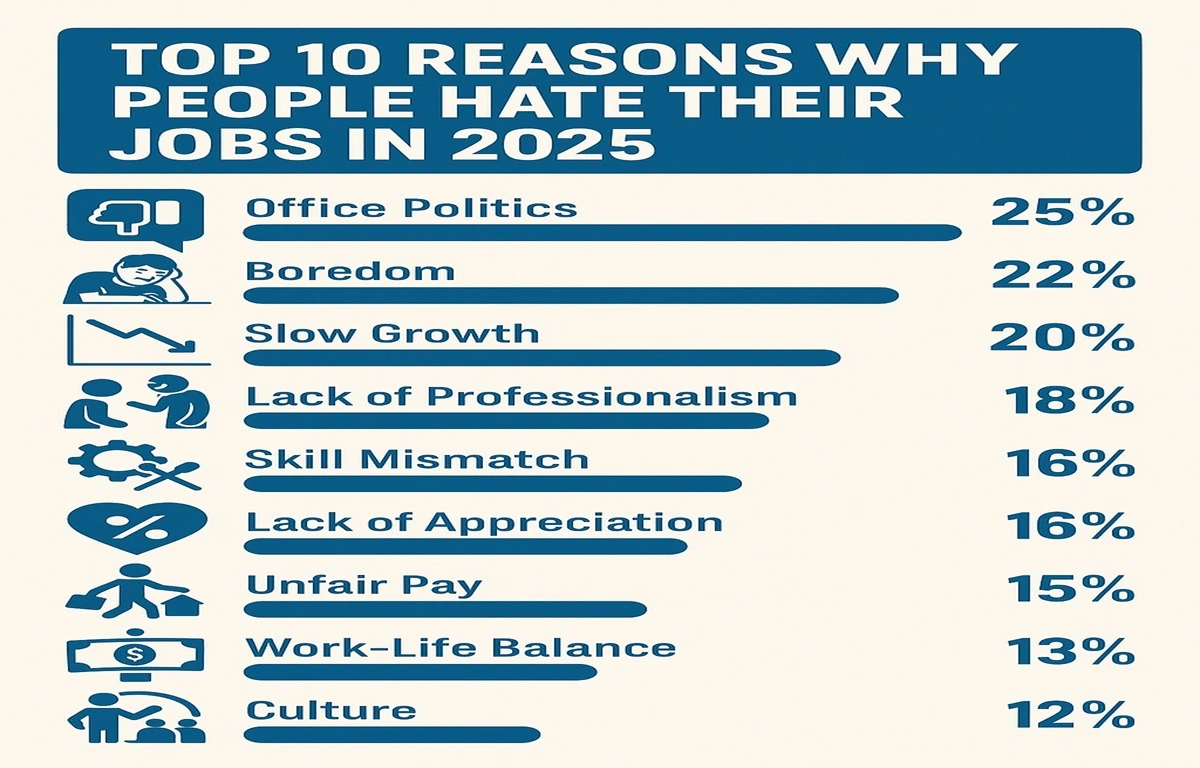An average person works for around 40 years in their lifetime. Usually, people start working in their early 20s and continue until the age of 60. This is a sufficiently long period. If we make a rough estimate, a person spends about one-third of their day working, and in some jobs, this duration is even longer. Job hate and dissatisfaction have become evident with growing work pressure.
According to a survey conducted by Zippia, the career expert, 50% of workers disliked their jobs, and 29% of those who disliked their jobs felt they were underpaid. In comparison, almost 22% of workers believed that underappreciation was the main reason for their job dissatisfaction.
The State of Global Workplace Report – Gallup in their 2024 report quoted that, “Global employee engagement declined to 21% in 2024, with managers experiencing the largest drop. This marks only the second decline in engagement in the past 12 years — a worrying sign for organizations already struggling with productivity.”
The studies mentioned above indicate that a large number of young people around the world hate their jobs, and this is significantly affecting their inner peace and mental health. Today’s article aims to highlight the issue of job dissatisfaction while guiding readers on the top 10 reasons why people hate their jobs.
Top 10 Reasons Why People Hate Their Jobs in 2025
What if I hate my job? – If this question comes to your mind frequently, then surely it has started concerning your mental health. With over 10 years of professional experience, I can confidently say that the following reasons accurately represent why the majority of people hate their jobs.

- Office Politics: Office politics increases turnover intentions suggests study conducted by Kacmar, K. M., Bozeman, D. P., Carlson, D. S., & Anthony, W. P. (1999) in their journal Human Relations, 52(3), 383–41 – “An examination of the perceptions of organizational politics model: Replication and extension”. Key findings of the study revealed that employees in political environments show 25–30% higher turnover intent.
- Boredom: An article published in Current Psychology revealed that Job boredom is one of the most prevalent aversive states experienced in the workplace. A daily diary study over 10 consecutive workdays with 120 individuals (1,160 observations) found that job boredom was positively related to job burnout at the within-person level. Job boredom is a result of unproductive and low-value-added work. When someone is assigned routine and repetitive tasks with no scope for skill development or knowledge enhancement, they start to experience boredom.
- Slow Growth: Job hate can be an outcome of slow career progression. People often work very hard and dedicate more time than necessary to their jobs, believing that this will lead to faster career advancement. However, slow growth gradually fades their passion for the job and eventually turns into hatred. According to the article published on ZenSai, a survey of ~1,000 professionals found that 82% would leave their current role due to slow career progression. Similarly, as per the HR Director report, 48% of professionals report a lack of advancement opportunities. A UK & Ireland survey of 10,600+ professionals highlighted that this is 32% up from the previous year.
- Toxic Work Environment: A Toxic work culture has a direct correlation with job hate. A research report published by iHire Press revealed that 3 out of 4 employees have experienced a toxic workplace; poor leadership and communication issues were cited as top toxicity drivers. Sharing the results of a survey of 2,285 U.S. workers and employers, iHire’s research suggests 74.9% of employees have worked for an employer with a toxic workplace, and 53.7% have quit a job because of a negative work environment. The full report is available at iHire Press.
- Lack of Professionalism: I personally believe that unprofessional behaviour at the workplace is one of the prominent reasons for job hate. Rudeness at the workplace severely impacts the performance and well-being of an employee. Korn Ferry survey shows negative personal and business impacts of a Rude Workplace. 81% of the respondents find it difficult to focus after someone has said something rude, and they have considered quitting a job due to a rude colleague or boss. More than half (57%) say that if a star performer were also rude to colleagues, their company wouldn’t do anything because that person gets results.
- Skill Mismatch: Many people complain that the skill sets used in their job do not align with their actual career aspirations. As per the article published on Testlify, Skills mismatch affects hiring and productivity. In the U.S. alone, skills mismatches resulted in a loss of $15,000 for each bad hire and over $30,000 when a skilled employee departs due to dissatisfaction, often because their talents are not utilized effectively in their roles. That’s a massive amount.
- Lack of Appreciation: When hard work, performance results, and appreciation don’t go hand in hand, then it becomes a major reason for job hate and dissatisfaction. Lack of appreciation fuels high turnover and job dissatisfaction. According to a WebMD Health Services article and TINYpulse data, 21.5% of employees who don’t feel recognized when they do great work have interviewed for a job in the last three months, compared to just 12.4% who do feel recognized. Consistent recognition can add 3.5 years to an employee’s tenure, and employees who feel appreciated are 5x more likely to stay at their organization.
- Unfair Pay: A recent Pew Research Center survey finds that about eight-in-ten blue-collar workers and other workers alike (82% and 80%) say a major reason for their job dissatisfaction is that their pay is not keeping up with cost-of-living increases. Unfair pay damages employees’ trust in the organization, which ultimately adds fuel to the job hate.
- Work-Life Balance: A person works to live a peaceful life; they don’t live just to keep working. A comprehensive research report published on The Interview Guys Blog revealed that the workplace burnout crisis has reached unprecedented levels in 2025, with new research revealing that 82% of employees are at risk of burnout, marking a significant escalation from previous years. As per Skillademia, Burnt Out Employees are 60% at a Higher Risk of suffering heart Problems, and 59% of Employees Have Considered Quitting Due to Work-Life Imbalance.
- Culture: The SEEK survey published in news.com suggests that a majority of millennials, Gen X workers regret career choices but feel trapped. Some 54 per cent of millennials, 57 per cent of Gen X workers, 52 per cent of Baby Boomers, and 40 per cent of Gen Z workers reported career regret, which is a sign of misaligned culture and values; poor workplace culture was cited strongly.

Must Read: What To Do When You Hate Your Job? -12 Helpful Tips
Conclusion
To conclude, job dissatisfaction has become a prominent issue in 2025. The facts and studies listed above justify all the true reasons responsible for job dissatisfaction. Reasons such as office politics, a toxic work environment, and work-life balance not only contributed to job hate but also led to a significant impact on mental health and burnout.
Please share this article within your network and subscribe to Synched Harmony for more content related to job and career aspirations. Feel free to check out our related blogs.

Greetings! I am the voice behind the thoughts presented on Synched Harmony. As an ordinary individual, I strive to live a life dedicated to achieving inner peace and serenity by cultivating harmony within and making difficult aspects of life work together in sync during tough phases of life. Life becomes much easier if we open ourselves to small changes and respect each other’s personal boundaries, creating space for shared happiness.


1 thought on “Job Hate and Dissatisfaction in 2025 – 10 True Reasons Revealed”
Comments are closed.